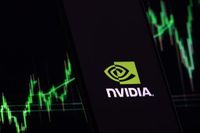Nvidia Corporation has witnessed significant developments in its business and stock performance as we progress through 2025. The semiconductor giant continues to dominate the AI chip market but faces both opportunities and challenges in the current economic and geopolitical environment.
Chinese technology companies have shown tremendous appetite for Nvidia’s AI hardware. ByteDance, Alibaba Group, and Tencent Holdings placed at least $16 billion in orders for Nvidia’s H20 server chips during the first quarter of 2025, according to a report from The Information. This surge in orders highlights the ongoing demand for AI infrastructure in China. The H20 chip represents Nvidia’s most advanced AI processor legally available in the Chinese market under current US export controls.
The H20 was specifically designed to comply with restrictions imposed in October 2023, which prevent the export of Nvidia’s most cutting-edge chips to China based on concerns about potential military applications. Despite the strong demand, there are signs of potential supply constraints. H3C, one of China’s largest server manufacturers, has warned about possible shortages of the H20 chip. This could create challenges for Chinese companies pursuing ambitious AI development plans.
H3C serves as a major OEM partner for Nvidia in China, alongside other firms like Inspur, Lenovo, and xFusion. The potential supply crunch comes at a time when Chinese firms are rapidly expanding their investments in artificial intelligence technology. Companies are racing to develop and deploy AI models similar to those created by US firms. One example is DeepSeek, a Chinese startup that has generated significant interest with its low-cost AI models, helping drive demand for Nvidia’s hardware in the region.
While Chinese demand remains robust, some investors are reassessing their positions on Nvidia stock. Eric Jackson, founder of EMJ Capital, recently told CNBC that he had sold his Nvidia shares and purchased Alibaba stock instead. Jackson suggested that “Alibaba is a better AI play than Nvidia at least through Q2 and maybe for the rest of the year.” He cited concerns about Nvidia’s recent technical performance, noting that the stock “hasn’t been acting well since earnings.”
Despite these concerns, Jackson acknowledged that Nvidia remains “a great company with great products” and praised the company’s product roadmap as “fantastic.” His preference for Alibaba appears to be more about relative value than fundamental problems at Nvidia.
Nvidia stock has struggled in early 2025, declining 18% since the beginning of the year through early April. This performance contrasts sharply with the company’s stellar gains in previous years. A major factor weighing on Nvidia shares is uncertainty surrounding US trade policy. President Donald Trump announced plans in February to impose tariffs of approximately 25% on imports of semiconductors and related products.
The market has been awaiting details on these tariffs, with a formal announcement expected. This policy uncertainty has created headwinds for semiconductor stocks broadly, with Nvidia caught in the crossfire. Nvidia CEO Jensen Huang has stated that the company anticipates minimal short-term impact from potential tariffs but would relocate production to the United States over the longer term if necessary.
Despite the geopolitical complications, China remains a crucial market for Nvidia. The company reported annual revenue of $17.11 billion from the China region (including Hong Kong) in fiscal 2025. Analysts note that Nvidia’s valuation has become more attractive amid the recent stock price decline. Shares currently trade at 23 times forecast earnings for the next 12 months, well below the five-year average multiple of 40 times.
Melius Research analyst Ben Reitzes pointed out that consensus estimates for Nvidia’s 2026 earnings have been revised upward by 37% since July 2024. However, the stock price doesn’t reflect these improved expectations, suggesting market concerns about geopolitical factors. Industry observers note that strong demand for AI chips continues unabated.
OpenAI CEO Sam Altman recently commented that his company is struggling to handle infrastructure demands from its popular image-generation tool and is seeking access to additional third-party chips. If semiconductor products are excluded from the upcoming tariff announcement, Nvidia shares could see a relief rally. However, this would likely depend on whether President Trump signals any intention for future actions targeting the chip sector specifically.
In contrast, Alibaba Group Holding Ltd is currently perceived as a better pick to bet on continued momentum in artificial intelligence. Jackson’s remarks arrive as Alibaba warms up to launching “Qwen 3” by the end of April 2025. Jackson likes the Chinese e-commerce and tech behemoth also for the strength of its financials.
In February, Alibaba reported earnings for its third quarter that handily topped Street estimates. More importantly, the AI stock currently pays a dividend yield of 1.51%, which makes it all the more exciting to own ahead of a potential recession. Investors should be pounding the table on Alibaba stock because it’s a great way to avoid the tariff tantrum, according to Quint Tatro of Joule Financial.
Alibaba generates as much as 90% of its revenue from China, with the US making up less than 5% of its annual sales. The Chinese giant plans on spending more than $50 billion on AI over the next three years, which may help unlock significant further upside in its share price.
Alibaba has seen triple-digit growth in its AI revenue over the past six quarters. In its latest earnings release, Eddie Wu, the company’s chief executive, told investors: “This quarter’s results demonstrated substantial progress in our user-first, AI-driven strategies and the reaccelerated growth of our core businesses.” Following the news of an upgraded AI model coming soon, analysts at Mizuho raised their price target on Alibaba shares to $170 this week, which translates to about a 35% upside from current levels.
All in all, while Alibaba stock has rallied hard in recent months, experts seem to be keeping bullish, calling for further upside as we advance through this year.





